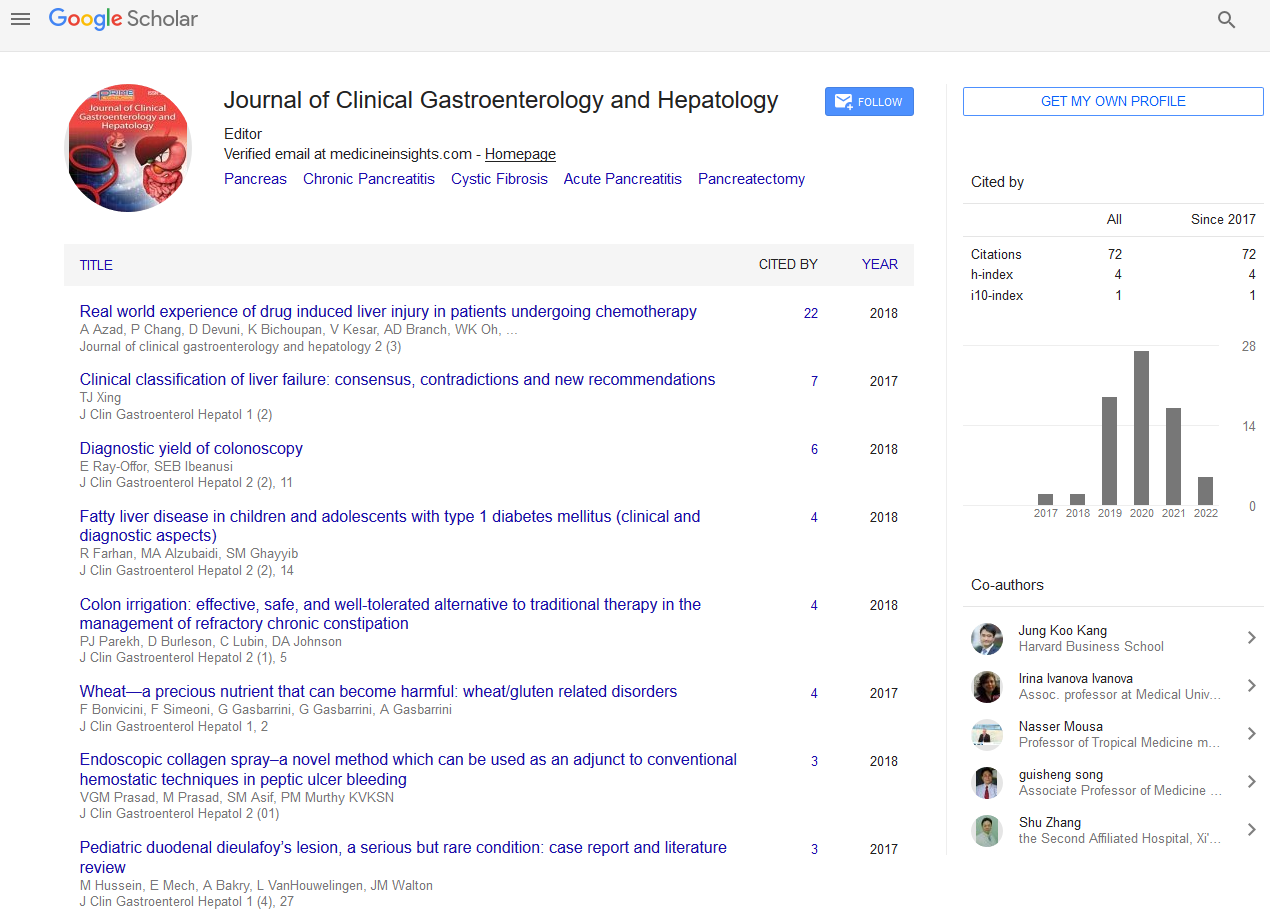Short Communication - (2023) Volume 7, Issue 6
The Pancreas: A Vital Organ in Human Physiology
Abella Can*
Department of Gastroenterology, Fudan University, China
*Correspondence:
Abella Can,
Department of Gastroenterology, Fudan University,
China,
Email:
Received: 29-Nov-2023, Manuscript No. IPJCGH-24-18968;
Editor assigned: 01-Dec-2023, Pre QC No. IPJCGH-24-18968 (PQ);
Reviewed: 15-Dec-2023, QC No. IPJCGH-24-18968;
Revised: 20-Dec-2023, Manuscript No. IPJCGH-24-18968 (R);
Published:
27-Dec-2023
Introduction
The pancreas, often overshadowed by its more well-known
counterparts such as the heart or lungs, plays a crucial role in
maintaining the delicate balance of our body’s internal environment.
Situated behind the stomach, this organ serves both
endocrine and exocrine functions, making it indispensable for
overall health and well-being. One of the pancreas’s primary
roles is to regulate blood glucose levels, a task accomplished
through its endocrine function. The organ contains clusters of
cells known as the islets of Langerhans, which produce hormones,
including insulin and glucagon. Insulin facilitates the
uptake of glucose by cells, helping to lower blood sugar levels,
while glucagon signals the liver to release stored glucose into
the bloodstream when levels drop too low [1,2].
Description
This intricate dance between insulin and glucagon is essential
for maintaining stable blood glucose levels and preventing
conditions like diabetes. In addition to its endocrine function,
the pancreas serves as an exocrine gland, producing digestive
enzymes that aid in the breakdown of nutrients in the small
intestine. These enzymes, including amylase, lipase, and protease,
play a vital role in digesting carbohydrates, fats, and proteins,
respectively. The pancreas releases these enzymes into
the pancreatic duct, which connects to the common bile duct,
eventually delivering them to the small intestine. Despite its
critical functions, the pancreas is susceptible to various disorders
that can impact its performance. One such condition is
pancreatitis, an inflammation of the pancreas often caused by
gallstones, alcohol abuse, or certain medications. Pancreatitis
can lead to severe abdominal pain, digestive issues, and even
organ damage if left untreated. Another common pancreatic
disorder is diabetes mellitus, characterized by an imbalance in
blood glucose levels. Diabetes results from the immune system
attacking the insulin-producing cells in the pancreas, while diabetes
typically develops due to insulin resistance. Both types
of diabetes require careful management to prevent complications
and maintain a healthy lifestyle. One of the most serious
concerns associated with the pancreas is pancreatic cancer.
Known for its aggressive nature and often late-stage diagnosis,
pancreatic cancer has a high mortality rate. Risk factors include
age, smoking, family history, and certain genetic conditions.
Symptoms may include abdominal pain, unexplained weight
loss, and changes in stool color. Early detection is challenging,
emphasizing the importance of regular health check-ups
and awareness of potential warning signs. Given the pancreas’s
vital role in overall health, it is crucial to adopt habits that
support its proper functioning. A balanced diet rich in fruits,
vegetables, and whole grains helps regulate blood sugar levels,
reducing the risk of diabetes [3,4].
Conclusion
Limiting alcohol intake and avoiding tobacco products are also
essential in preventing pancreatitis and pancreatic cancer.
While the pancreas may not receive the same attention as other
vital organs, its functions are indispensable to maintaining
a healthy and balanced internal environment. From regulating
blood glucose levels to aiding in digestion, the pancreas plays
a multifaceted role in supporting our well-being. Understanding
the importance of pancreatic health and adopting lifestyle
choices that promote its proper functioning are key steps toward
a longer, healthier life.
Acknowledgement
None.
Conflict Of Interest
The authors declare that they have no conflict of interest.
References
- Zhou Q, Melton DA (2018) Pancreas regeneration. Nature. 557(7705):351-358.
[Crossref] [Google Scholar]
- Sally M Marshall (2020) The pancreas in health and in diabetes. Diabetologia. 63(10):1962-1965.
[Crossref] [Google Scholar]
- Leung PS (2010) Overview of the pancreas. Adv Exp Med Biol. 690:3-12.
[Crossref] [Google Scholar]
- Leung P (2010) Physiology of the pancreas. Adv Exp Med Biol. 690:13-27.
[Crossref] [Google Scholar]
Citation: Can A (2023) The Pancreas: A Vital Organ in Human Physiology. J Clin Gastroenterol Hepatol. 7:51.
Copyright: © 2023 Can A. This is an open-access article distributed under the terms of the Creative Commons Attribution License, which permits unrestricted use, distribution, and reproduction in any medium, provided the original author and source are credited.

